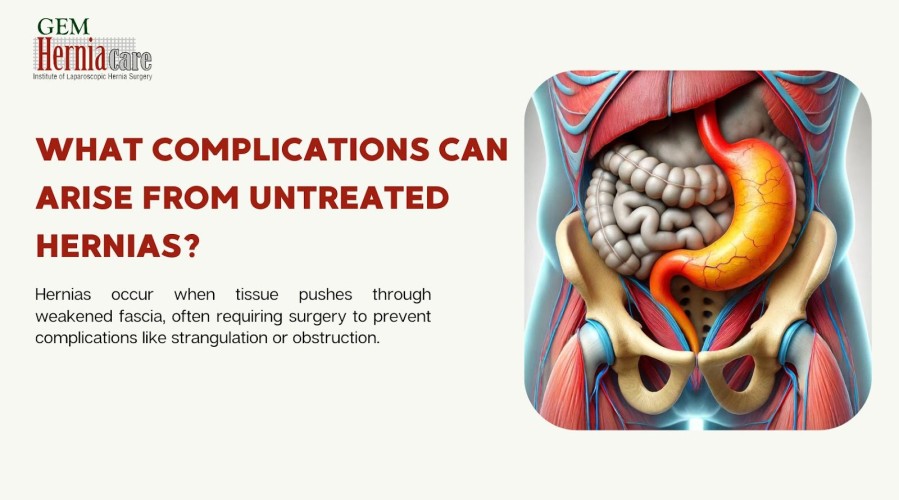Learn effective solutions for digestive problems with expert tips to improve gut health, reduce discomfort, and maintain a healthy digestive system.
What Complications Can Arise from Untreated Hernias

What Complications Can Arise from Untreated Hernias
A hernia occurs when an organ or fatty tissue squeezes through a weak spot in a surrounding muscle or connective tissue called fascia. Most commonly occurring in the abdomen, hernias are not immediately life-threatening, but they don’t go away on their own. Sometimes, they can require surgery to prevent potentially dangerous complications.
Common Types of Hernias
Hernias can come in various forms, each with its own specific implications and potential for complications:
- Inguinal Hernias: These are the most common type of hernia and occur when the intestines push through a weak spot in the lower abdominal wall.
- Hiatal Hernias: This type occurs when part of the stomach pushes up through the diaphragm into the chest cavity.
- Umbilical Hernias: Often seen in babies, this happens when the intestines bulge through the abdominal wall near the belly button.
- Incisional Hernias: These can occur after abdominal surgery, where the intestine pushes through the incision scar or the surrounding weakened tissue.
Potential Complications from Untreated Hernias
Strangulation
One of the most severe complications of an untreated hernia is strangulation, which occurs when the blood supply to the herniated tissue is cut off. This can lead to the death of the tissue, a condition that is life-threatening and requires immediate surgery.
Obstruction
Hernias can cause bowel obstruction, which blocks the passage of bowel contents. This can lead to pain, nausea, vomiting, and the inability to have bowel movements or pass gas. Such symptoms necessitate urgent medical attention to avoid further complications like strangulation.
Pain and Discomfort
While some hernias are asymptomatic, others can cause considerable pain and discomfort, especially when doing activities that increase intra-abdominal pressure such as lifting, bending, or coughing. This can significantly impair one's quality of life.
Increased Risk During Surgery
If surgery is required for another condition, an existing hernia can complicate anesthesia and postoperative recovery. It’s crucial to address a hernia before elective surgeries to mitigate these risks.
Hernia Treatment Options
Treatment for a hernia can vary depending on its size and the severity of the symptoms. Options include:
- Watchful Waiting: Small, non-straining hernias without symptoms might not require immediate surgery and can be monitored.
- Surgical Repair: This is the most common treatment for hernias that cause pain or other symptoms, or that are enlarging. Surgery can often be performed laparoscopically, which is less invasive and allows for quicker recovery.
Lifestyle Changes and Home Remedies
In addition to medical treatments, certain lifestyle adjustments can help manage the symptoms of a hernia:
- Maintaining a Healthy Weight: Excess weight can put more pressure on the abdominal wall and exacerbate a hernia.
- Avoiding Heavy Lifting: Lifting heavy objects can strain your abdominal muscles and worsen a hernia.
- Eating High-Fiber Foods: This can prevent constipation, which can cause straining during bowel movements.
Schedule a Consultation
If you suspect that you have a hernia or have been experiencing any related symptoms, it is crucial to seek professional medical advice. For expert care, consider scheduling an appointment with GEM Hospital. Our specialists are ready to provide you with the support and treatment you need to lead a comfortable life.
Blogs & Article
Explore current research trends in digestive health, including new treatments, advanced diagnostics, and innovations improving gut health and patient care.
Discover common digestive health myths and the real facts. Learn simple tips to improve gut health and maintain better digestion for a healthier life.


